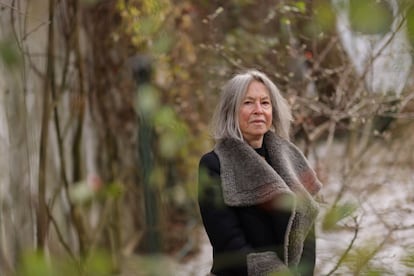Poet Louise Glück, Nobel Prize winner in Literature in 2020, dies at 80
The American writer had a sharp, clear and honest style that did not avoid facing pain and family traumas


New York poet Louise Glück, winner of the 2020 Nobel Prize in Literature, died Friday at the age of 80, her publisher at Farrar, Strauss & Giroux, Jonathan Galassi, confirmed to the Associated Press. The causes of her death were not immediately clear.
Glück, who had a sharp, clear and honest style that did not avoid facing pain and family traumas, was one of the most beloved poets in the country and the first American poet to win the highest global literary award for her verses since T. S. Eliot in 1948. She also served as poet laureate of the Library of Congress from 2003 to 2004, and President Barack Obama honored her in 2016 with the National Humanities Medal.
A professor at Yale University, Glück had won all the awards in her country: from the Pulitzer for The Wild Iris (1992) to the National Book Award for Faithful and Virtuous Night (2014). In 2020, she was also awarded the Tranströmer Prize in Stockholm, promoted in memory of the last Swedish Nobel Prize winner, who died in 2015. When she received the Nobel Prize, judges praised “her unmistakable poetic voice that with austere beauty makes individual existence universal.”
Born and raised in a suburb of Long Island, she debuted in 1968 with the collection of poems Firstborn, a work in which she already claimed her lineage as a writer in the confessional lineage of Sylvia Plath, Emily Dickinson or Robert Lowell. In her 15 books (13 of them containing poems, plus two collections of essays), she spoke of childhood and family, loneliness and death.
The granddaughter of Hungarian Jews who emigrated to the United States, she grew up studying Greek mythology, which inspired some of her best verses. Her father contributed to the invention of the X-Acto knife, and the scalpel analogy helped lazy critics praise the precise way in which the daughter used language in her verses.
She always knew she wanted to write, although she also flirted with the idea of becoming an actress. She quickly discarded it, as she said in one of her rare interviews, granted in 2012, the year of the publication of her collected poetry, which came at exactly the right time and became a rare publishing event in the United States.
She was allergic to the spotlight, and disliked interviews. She made a rare exception the morning she received a call from Sweden to tell her that she was the first American writer to receive the Nobel Prize for Literature since 1993 (Toni Morrison). She later said: “The first thing I thought was: ‘I’m going to run out of friends. Because a lot of them are writers.” She was also confident that she would finally be able to afford the house she wanted to buy in Vermont. She worried that fame was going to take her away from her routines.
Sign up for our weekly newsletter to get more English-language news coverage from EL PAÍS USA Edition
Tu suscripción se está usando en otro dispositivo
¿Quieres añadir otro usuario a tu suscripción?
Si continúas leyendo en este dispositivo, no se podrá leer en el otro.
FlechaTu suscripción se está usando en otro dispositivo y solo puedes acceder a EL PAÍS desde un dispositivo a la vez.
Si quieres compartir tu cuenta, cambia tu suscripción a la modalidad Premium, así podrás añadir otro usuario. Cada uno accederá con su propia cuenta de email, lo que os permitirá personalizar vuestra experiencia en EL PAÍS.
¿Tienes una suscripción de empresa? Accede aquí para contratar más cuentas.
En el caso de no saber quién está usando tu cuenta, te recomendamos cambiar tu contraseña aquí.
Si decides continuar compartiendo tu cuenta, este mensaje se mostrará en tu dispositivo y en el de la otra persona que está usando tu cuenta de forma indefinida, afectando a tu experiencia de lectura. Puedes consultar aquí los términos y condiciones de la suscripción digital.








































